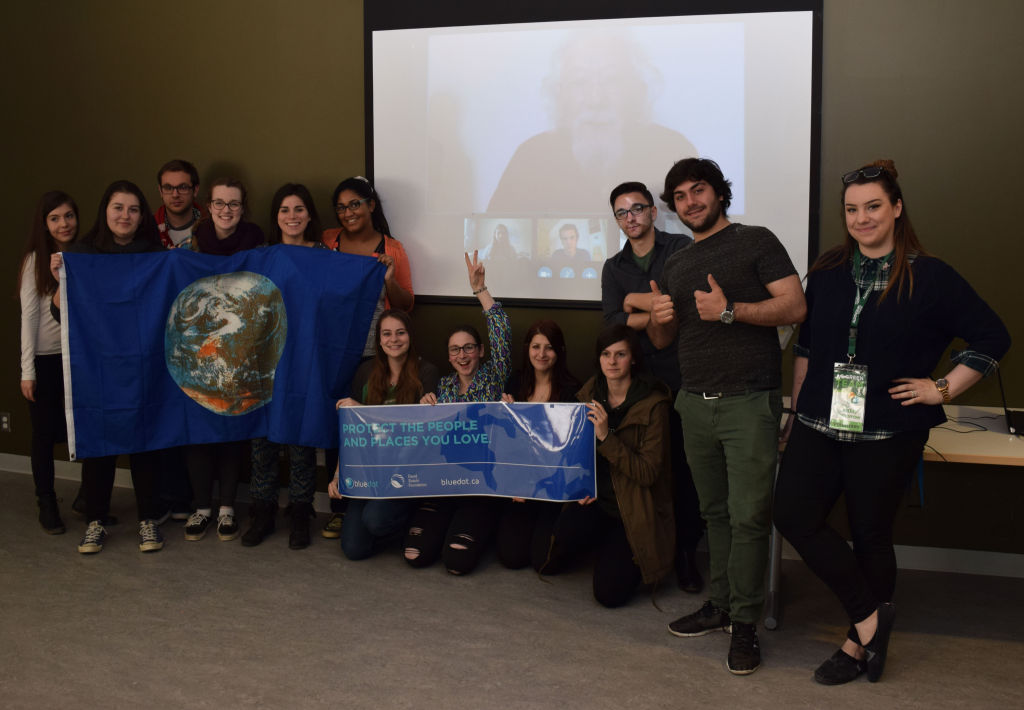
When the image came on screen, the group of 30 or so environmental students could see only the red of a person’s shirt and hear a distant voice in the background. The girls screamed as they quickly recognized his distinguishable deep voice from his show The Nature of Things and the many television appearances and talks he had made over the years.
It was David Suzuki.
The Vancouver born environmentalist, who has been well known for his involvement in helping the environment since the 80s, was in front of them face-to-face through Skype during their regular class on April 5 .
Earth Allies, a student group consisting of first-year environment study students, won first place for Suzuki’s Blue Dot Movement – a campaign for the right to clean air, clean water, and clean food for every Canadian, with over 1,000 signatures. The result? The group could ask two questions of its choice to Suzuki over Skype. Other schools that placed in the top three rankings from across Canada were also chosen to ask two questions to Suzuki.
Algonquin environmental studies student Shay Escander was one of the group members to ask Suzuki a question.
“At one point I thought I was going to cry, and didn’t pay attention to anything he was saying,” said Escander.
She used the opportunity to ask Suzuki if he believes that the commitment on the federal budget is a step in the right direction, to one day soon affordthe environmental rights to first nations and northern communities and to the rest of Canada.
“Absolutely,” he replied. “I think we’ve gone through 10 years of very very dark times.” “When you depend on one of a few people for all of your ideas, you become vulnerable. Diversify it,” he added.
Suzuki looks forward to the future and said that that even the change in government is good news for Canada. During the election he strategically voted Liberal, even though he usually votes for the NDP or Green Party, primarily because he wanted Steven Harper to step down from his role as Prime Minister.
“Trudeau has created the first gender balanced cabinet, and that’s huge,” said Suzuki. What is also huge he said, is that there is 10 aboriginals as MPs.
From the other questions that were asked, Suzuki touched on the past and future of the environmental movement, the government’s current and prior role and how Canadians need to change the way that they are harvesting energy.
When Suzuki looks back on what he and other environmentalists have done, he said environmentalism has failed. The same problems from 35 years ago are coming back again, he said, even though they stopped dams from being built and oil to be drilled, as well as putting millions of hectors of land under protection.
The students were told not to think of environmentalism as a discipline but simple a way of seeing the world.
“The world is going to do fine,” he told them.
“We can’t advocate fighting battles over and over again,” said Suzuki. “It’s about changing how we live, and how our children and grandchildren are going to live.”
Suzuki also told the students to follow their dreams and passions because only then will they work to the best of their abilities as human beings. It’s simple, he said; by living a day to day life and looking through the lenses of environmentalism, the world will change.
During the call there were a few technical glitches, where Suzuki or the students were unable to hear each other, said Nathalie Mimeault, who is a member of Earth Allies.
She thought overall the questions and conversation was great and that the experience was more than she ever expected.
David Suzuki took the part in the more personal internet call with a select group of attendees on April 5. They were mostly from university and high school groups that worked together to gather signatures for Suzuki’s Blue Dot Movement.
According to Escander, the reason Suzuki chose to do the Skype conversation instead of meeting them in person was because he wasn’t flying much anymore due to criticism over his carbon foot print from all the flights. She said he decided to stop now and Skypes from his home in Vancouver most of the time.


